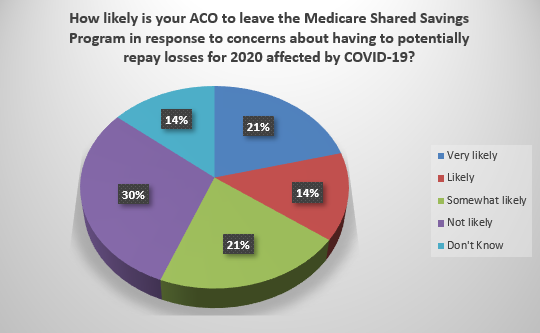|
Download as PDF
News Release
April 13, 2020
More than Half of Participants Likely to Leave Cost-Saving Medicare Program
NAACOS Poll Asked About Impact of COVID-19 Pandemic
WASHINGTON – More than half, 56 percent, of healthcare organizations taking financial risk in a Medicare program proven to lower the cost of care said they are likely to drop out of that program because of fear of having to pay massive losses resulting from the COVID-19 pandemic, as shown by a new survey featured in a report released today.
The National Association of Accountable Care Organizations (NAACOS) surveyed the ACO community to gauge their experience in handling the ongoing pandemic. As a result of swings in unpredictability and spikes in expensive hospitalizations, 21 percent of at-risk ACOs said they were “very likely” to leave the Medicare ACO program, 14 percent said they were “likely,” and another 21 percent said they were “somewhat likely” to leave. Almost 80 percent of ACOs said they were “very concerned” about their ACO performance this year.
The Medicare Shared Savings Program, first piloted during the George W. Bush administration and fully launched in 2012, rewards ACOs, which are groups of doctors and hospitals who voluntary come together to take responsibility for the costs and quality of a defined set of patients, for lowering spending and improving outcomes for patients. The program has saved as much as $3.53 billion from 2013 to 2017. Almost 20 percent of Medicare beneficiaries and nearly 500,000 clinicians practice in an ACO in 2020, making the Shared Savings Program the largest value-based payment model in Medicare.
“When ACOs made a commitment to assume risk, they didn’t expect they’d be handling the risk of a global pandemic,” said Clif Gaus, Sc.D., NAACOS president and CEO. “Rather than be forced to pay enormous losses resulting from the pandemic, these groups of providers may sadly quit the program, which they can do without penalty by May 31. Medicare’s decade-long effort to change how we pay for health care to better reward quality and outcomes may be lost unless Washington acts quickly to throw these providers a lifeline.”
NAACOS surveyed the ACO community in an online poll between April 3 and April 8. The 5-question online survey went to all 2020 Medicare Shared Savings Program and Next Generation ACO Model participants, including NAACOS members and nonmembers. There were 304 responses from 226 ACOs across the country.

A NAACOS analysis estimated the ongoing COVID-19 pandemic could cost Medicare between $38.5 billion and $115.4 billion over the next year. Providers are also seeing disruptions in chronic care management as routine, in-office visits are cancelled. Quality control staff are being diverted to handle COVID-19 response elsewhere. Elective procedures, which are being delayed now, are likely to be rescheduled for later in the year when the pandemic eases.
A quarter of survey respondents said they expect spending to increase by more than 10 percent as a result of the pandemic. Almost another quarter said they expected spending to increase between 5 and 10 percent. Only ten percent said they expect spending to remain the same or fall because of the pandemic, and the remaining 37 percent of respondents selected “don’t know,” illustrating the great uncertainty they face.
NAACOS and nine other leading healthcare organizations asked the Centers for Medicare & Medicaid Services (CMS) last month to hold harmless providers participating in alternative payment models from performance-related penalties for 2020, among other requests. “CMS has yet to adequately mitigate the costs and disruptions of the pandemic,” Gaus said. “ACOs are telling us that they will leave the program unless there is protection from the losses of the pandemic, and it would be a tragedy for millions of Medicare beneficiaries to lose the access to care coordination and quality improvement that ACOs offer.”
“Because of the work of ACOs, many communities already had programs in place that are helping patients during this challenging time. For example, ACOs have been instrumental in establishing initiatives such as care management at home through both post-discharge and care management visits, telemedicine, integrated home health, effective relationships with post-acute providers, and an understanding and use of waivers,” Gaus said. “While that work has helped our health system pivot in their COVID responses, the financial strain and external forces may be too much to survive this pandemic.”
|